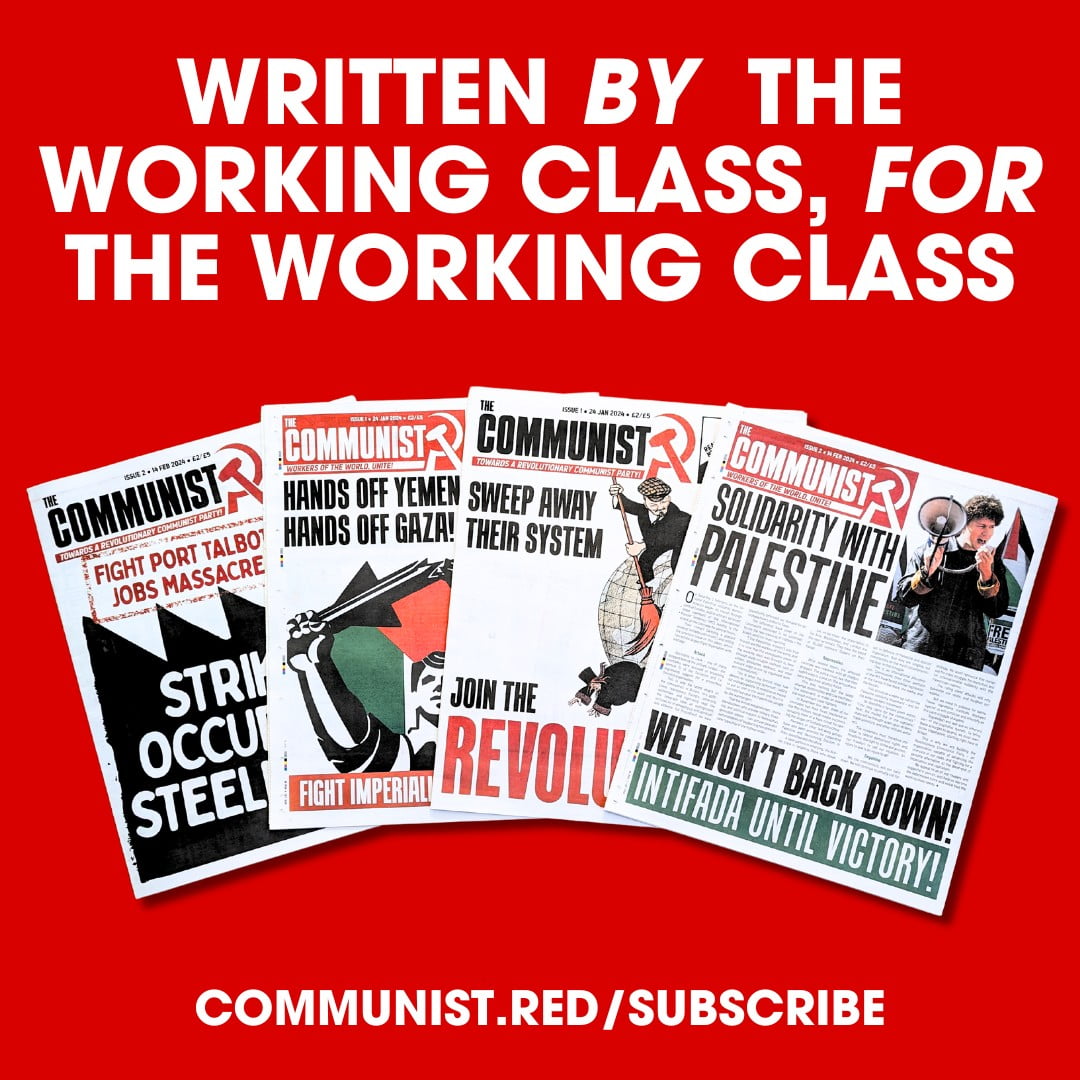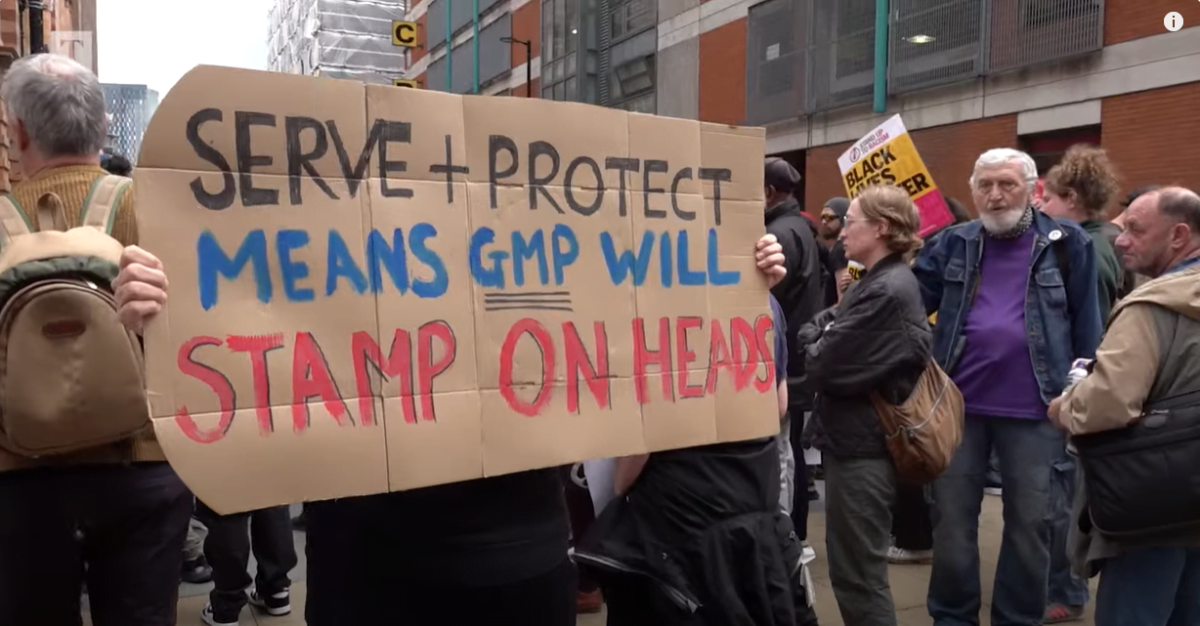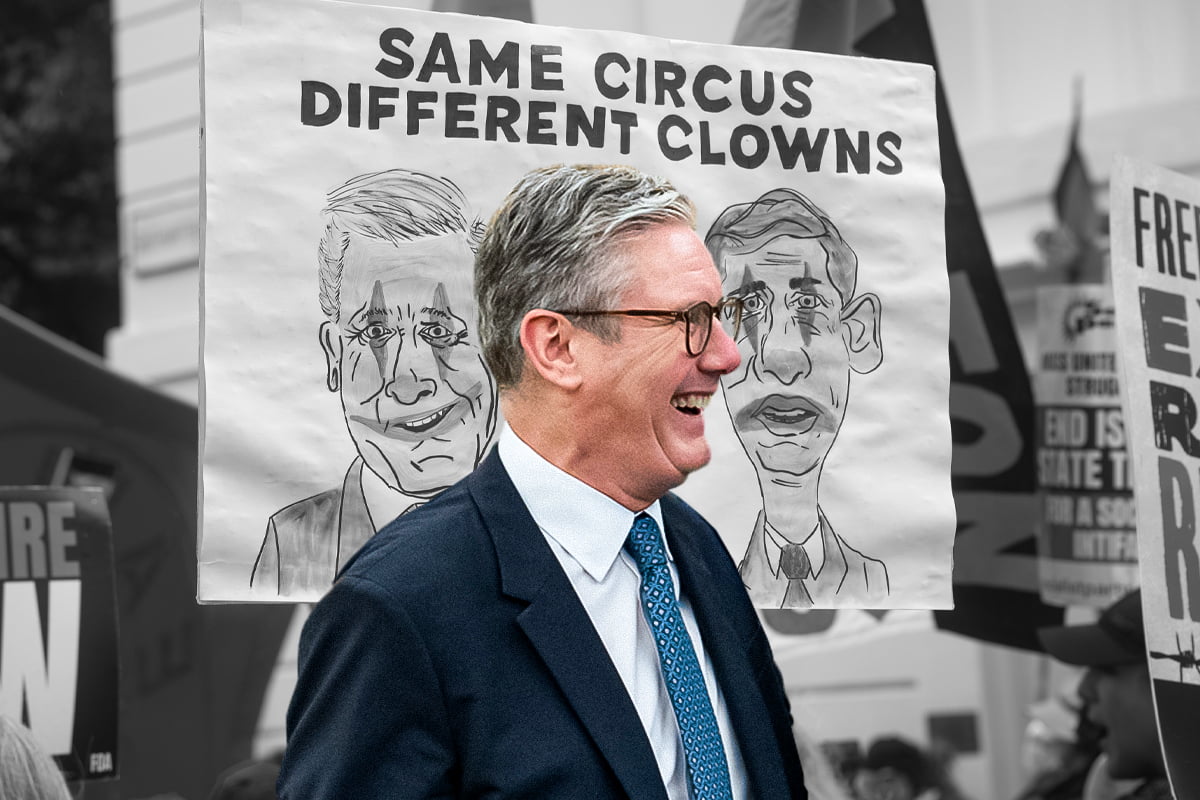From the main squares of US cities to the streets of Istanbul, from
London to Sydney, demonstrators came out in support of the Iraqi people
and in rejection of the two year long imperialist occupation of Iraq.
Significantly, London held one of the biggest demonstrations, with a
100,000 strong crowd marching from Speakers’ Corner in Hyde Park to
Trafalgar Square. Large demonstrations also took place in Istanbul and
Buenos Aires. In a festive mood activists from Leeds, Cambridge,
Brighton, Birmingham and many other areas in England joined Londoners
in a national march organised by the Stop the War Coalition.
Trafalgar Square: end of the London demo |
The demonstration ended in Trafalgar Square where various speakers
addressed the protestors. Amongst them were Jeremy Dear (NUJ), Paul
Mackney (NATFHE), Tony Benn and Rose Gentle, the mother of a Glasgow
soldier killed in Iraq and activist in the Military Families Against
the War.
One of the most interesting comments was made by Jeremy Dear. He
highlighted the struggle of the Venezuelan people against imperialism
and for democracy. The Venezuelan Revolution must be a source of
inspiration for the anti-war movement.
In numbers, the March 19 demonstration did not compare with the
massive two million-strong demonstration that took place just before
the war. This is understandable at this stage. The massive turnout two
years ago expressed clear mass opposition to the war, but it did not
stop the war from taking place. Many people on that demo must have
thought that with such a huge turnout the government would be forced to
listen. Of course it didn’t. Many must have thought, “What else can we
do to stop this war?”
As Marxists, we understand that to stop the capitalists from going
to war you have to overthrow them. When it comes to their most direct
and crucial material interests, capitalists are not moved simply by
“public opinion”. What is necessary is a wider movement, involving the
working class.
This does not mean that such demonstrations have no use or meaning.
Far from it! Big, successful demonstrations can boost the morale of
labour movement and youth activists. They can show them that something
in society is stirring.
The fact that this weekend’s demonstrations were nowhere near as big
as those of two years ago is not the end of the story. What is
interesting is who was on the demonstrations. Soldiers’, soldiers’
families and even veterans from the first war in Iraq in 1991, have
been getting involved. Even the bourgeois media could not ignore this.
AP quoted Ray Hewitt, 34, a veteran of the 1991 Gulf War: “I disagreed
with [the war] to start with because I was suspicious of the weapons of
mass destruction claims, I saw the Iraqi army in 1991 and we destroyed
it.”
Statements like this show that there is growing discontent that is
reaching new layers of society. One British soldier has already called
for a mass refusal to serve in Iraq. Lance Corporal George Solomou from
the Territorial Army recently echoed the discontent of a growing number
of soldiers when he stated, “I am not going to Iraq, point-blank. I am
a conscientious objector to this war… I would rather spend a year in
prison than a minute in Iraq as part of an illegal war” (The Guardian, February 15, 2005).
What is missing is a concrete strategy on the part of the leadership
of the anti-war movement. They have been incapable of linking up the
anti-war mood with other social and class issues. Opposition to the war
is not an abstract question. It expresses opposition to the policies of
the capitalist class. Recent internal disputes about the nature of the
Iraqi resistance have also seriously undermined the Stop the War
Coalition.
There were very few speakers at the rally who dared to mention the
word imperialism. This is not the best way to catch the imagination of
working people and youth. Watering down the way you define the ongoing
slaughter in Iraq is not the best way of attracting workers and youth.
The Stop the War Coalition has insisted on remaining a single-issue
campaign that refuses to take on board new issues. This is also not
positive for the movement.
The Stop the War Coalition leadership should broaden its outlook and
start to take on board new anti-imperialist struggles that are catching
the imagination of a growing layer of trade unionists and youth
activists – like the Venezuelan and Cuban Revolutions or the struggles
of the Bolivian people against the looting of their hydrocarbons by US
companies. This would be the way to revive a movement that is passing
through a lull, not just in Britain but also internationally.
In the US, protests took place in New York and San Francisco amongst
other cities. In New York, up to 400 anti-war activists stopped traffic
and marched carrying US flag-draped cardboard coffins to mark the
second anniversary of the war in Iraq. Some demonstrators were arrested
in New York as they blocked traffic to demand that US troops be brought
home. In San Francisco there were no incidents due to the emphasis on
the peaceful nature of the demonstration by the organisers of the
march. Past demonstrations and marches in San Francisco have been
marked by violent clashes between protesters and the police.
In Istanbul, more than 15,000 people marched in the Kadikoy
neighbourhood to protest against the US led occupation in Iraq. This
was not the only protest held in Turkey, in Adana, in the south of the
country, home to a Turkish military base used by American forces,
protesters laid a black wreath in front of the US Consulate to protest
against the war.
A 500 strong crowd also marched to the US Embassy in Warsaw, holding
banners reading “Pull out from Iraq now” and “Poles back to Poland.” In
Athens, Greece about 3,000 trade unionists, members of peace groups and
students blocked the city centre for about three hours as they marched
to the US Embassy. In Sweden, about 300 anti-war activists came
together in Sergel Square in downtown Stockholm, chanting: “USA, out of
Iraq!” Up to 5,000 people (local police said 3,000) came out in
Barcelona behind a banner that read, “All troops out! No to the
occupation of Iraq and Palestine.”
The fact that this weekend’s demonstrations were generally nowhere
near as large as those of two years ago is not an indication that
people are not against the war. All opinion polls show that the numbers
opposed to war are growing.
As the imperialist forces become further bogged down in Iraq, and as
the growing social problems at home assume more importance, we will see
a movement that will combine opposition to imperialist war with
opposition to the capitalists at home.






